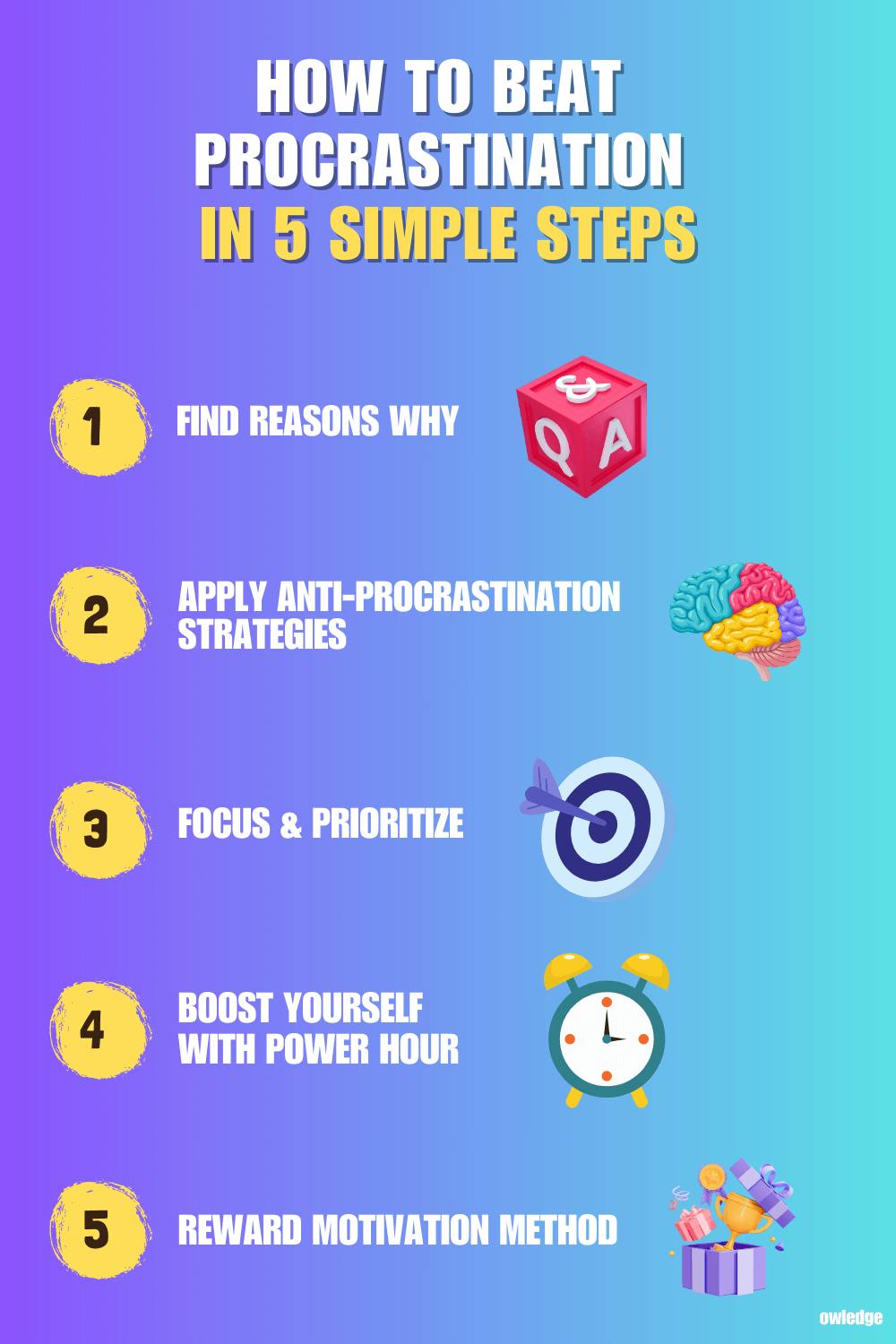
February 01, 2023
Why procrastination is bad? 5 effective steps to beat it today
Are you unnecessarily postponing important tasks? If your answer is yes, it means you’re procrastinating, and that’s quite bad. With these 5 effective steps beating your procrastination would never be easier.

Don’t fall into the procrastination trap! Procrastination hurts one’s performance, career, financial status, relationships, morale, and well-being. It can lead to stress, which in turn leads to mental and physical health issues.
Let’s beat procrastination and work more effectively from home by following these 5 proactive steps!
1. Realize that you’re procrastinating 🛋
You aren’t necessarily procrastinating if you’re briefly putting off a task for a genuinely good reason. You’re procrastinating if you start delaying the task on an indefinite basis because you want to avoid the work. You’re also the procrastinating type if you:
- Fill your daily agenda with low-priority tasks
- Leave an important activity on your to-do-list for a long time
- Go off to make a coffee the minute you start working on a high-priority task
- Keep waiting for the right time to tackle a task
- Start working on unimportant tasks for other people instead of finishing the important ones already on your list
Keep in mind, recognizing procrastination is the first and most important step!
2. Understand WHY are you procrastinating❓
Once, you realize that you’re procrastinating, it’s crucial to understand WHY? Why, because you can’t handle the issue if you don’t know the reason why it occurred in the first place.
Are you avoiding a specific task because you think it’s uninteresting or unpleasant? If that’s the case deal with it quickly, so you can focus on the more enjoyable aspects of the job.

If you got poor organizational skills, most likely they’ll lead you to procrastination. Start learning how to organize yourself and how to set your priorities. Procrastination is something organized people successfully overcome. Follow their lead, and use a prioritized to-do list and an effective schedule.
Don’t be afraid of failure, don’t feel overwhelmed by a task, and try not to be a perfectionist! You’d be surprised how often perfectionists become procrastinators.
3. Implement anti-procrastination strategies 🥁
Now that you know you’re procrastinating, it’s time for the next step. Let’s do something about it! Even though we can’t break this nasty habit overnight, we can start by practicing some of these anti-procrastination strategies:
- Leave your procrastinating behavior in the past
- Commit to your task
- Be persistent and let someone check up on you
- Avoid distractions
- Clear the unpleasant tasks as soon as possible
- Think about the results
In the entire anti-procrastination strategies implementation process, concentrate on the long-term benefits. When you know that it could affect your annual performance review or your bonus at the end of the year, you’ll think twice before procrastinating!
Another informative article on this topic: How to stop being lazy while working from home
4. Stay focused 🎯
The most important tool when fighting procrastination is the focus. We often become overwhelmed when we have too much to do and lose focus. It’s wise to choose one thing to commit to.

When you narrow it down to one task, take immediate action. Even if it’s a small one it’s still an action that’ll keep you on the right track away from procrastination. Focus goes hand in hand with the organization. So, if you want to stay focused you’ll need to implement these organizational skills:
- Use a to-do-list
- Create an Action Plan to organize a project
- Schedule activities on your calendar
- Prioritize activities
- Set time-bound goals
- Do the hardest tasks when you’re most efficient
If you’re looking at a large project and you’re tempted to delay it, do NOT! Divide the project into smaller tasks and focus on their start, rather than their finish. That way you’ll keep procrastination at a safe distance.
If you're still not productive enough, check our article: 5 Working Tips For Productivity While Working From Home
5. Use a power hour 🧭
To harness the optimal performance of your brain and body use a power hour! What’s a power hour you might ask? It’s an hour (or even less) of putting aside all distractions and to start working fully concentrated.
Within that power hour, you should also foresee short periods of rest, to restore your energy. Scientists have come to the conclusion that our brain works through cycles, “ups and downs” to be more precise. They believe that to honor those “ups and downs” you should balance concentrated focused time with relaxation.
The time for rest is crucial. For maximum output, balance it well within the power hour!
Check out the latest article: How To Manage Your Time Better
Extra Tip: Kill it with compassion 🕊
Don’t beat yourself up about past procrastination. The sooner you put it behind, the better! Be compassionate, and forgive yourself. By getting over past procrastination you’re more likely to overcome your current procrastination and take action.

Self-compassion is something we can all work on. That way we’ll be able to make peace with our past decisions leading to procrastination, and start fresh. To overcome self-compassion and cultivate a healthier relationship with oneself, consider implementing the following 5 techniques:
- Practice Self-Awareness: Start by acknowledging and becoming aware of self-critical thoughts and behaviors. Observe how you talk to yourself and identify patterns of negative self-talk. This heightened self-awareness will help you catch self-compassion in the act.
- Cultivate Self-Compassion: Counter self-criticism with self-compassion. Treat yourself with the same kindness and understanding you would offer a friend facing similar challenges. Practice self-compassion exercises, such as writing compassionate letters to yourself or using positive affirmations.
- Challenge Negative Thoughts: Challenge the validity of self-critical thoughts by examining the evidence supporting them. Often, we tend to exaggerate our flaws or focus solely on our weaknesses. Counter these thoughts with evidence of your accomplishments, strengths, and resilience.
- Set Realistic Goals: Aim for achievable and realistic goals rather than pursuing perfection. Recognize that making mistakes is a natural part of growth and learning. Embrace failures as opportunities for growth, not as reflections of your self-worth.
- Practice Mindfulness: Engage in mindfulness practices to stay present and non-judgmental of your thoughts and emotions. Mindfulness helps create distance from self-critical thinking and fosters a compassionate attitude towards oneself.
Combining these techniques can help shift your mindset from self-critical to self-compassionate, leading to improved well-being, increased resilience, and a more positive self-image. Remember that overcoming self-compassion takes time and effort, so be patient and kind to yourself throughout the process.
Extra Tip: Create a reward🏅
We love rewards! Our brain is stimulated by rewards. So, it doesn’t hurt to treat yourself once you finish a certain task. A powerful strategy to overcome inertia and regain focus. Here's a simple approach in 5 steps:
- Identify the Task: Clearly define the task you need to complete and set a specific timeframe to work on it.
- Set a Reward: Choose a rewarding activity that you genuinely enjoy and can indulge in once you complete the task. It could be watching an episode of your favorite show, taking a short walk, or having a delicious snack.
- Create Milestones: Break the task into smaller, manageable milestones. Each time you accomplish a milestone, treat yourself to a mini-reward.
- Visualize Success: Imagine how good it will feel to complete the task and enjoy the reward. Visualizing success can boost your motivation.
- Stay Accountable: Share your plan with a friend or family member who can support and encourage you.
By incorporating rewards into your productivity strategy, you can transform procrastination into a motivating force, making tasks more enjoyable and increasing your overall productivity.

A reward is a great motivator, that’ll keep you on the right track while working on a project. It’s probably procrastination’s worst enemy. It also helps you stay focused. When you have your eyes on the prize it’s much easier to commit your time and energy to the task and take immediate action.
Conclusion 📍
Implement these 5 proactive steps, and be the best version of yourself! Don’t think twice, try them out!
Check out 5 Steps On How To Achieve Your Goals Working Remotely article!
### Useful Links
What is Owledge? - Learn more about Owledge in 1 short article.
Join Our Discord Community - we post 100+ freelancing jobs, news and trends daily!
Try Owledge For Free - to explore our app for freelancers, agencies, solopreneurs and small businesses!
You can also follow us on Facebook, Twitter, Pinterest & LinkedIn.